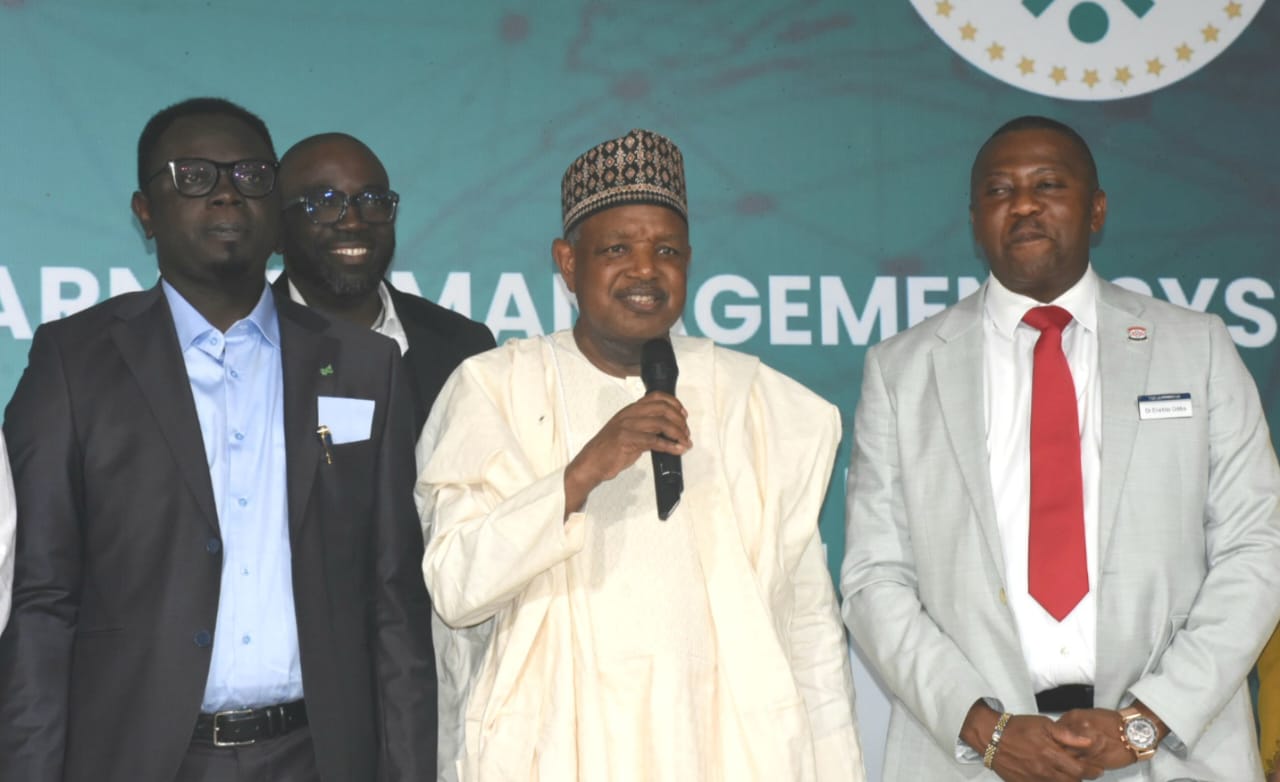Business
FG, States, LGCs Share N1, 678 Trillion From A Gross Total Of N2, 344 Trillion For February

The Federation Account Allocation Committee (FAAC), at its March 2025 meeting chaired by the Honourable Minister of Finance and Coordinating Minister of the Economy, Wale Edun, shared a total sum of N1.678 Trillion to the three tiers of government as Federation Allocation for the month of February 2025 from a gross total of N2.344 Trillion.
From the stated amount inclusive of Gross Statutory Revenue, Value Added Tax (VAT), Electronic Money Transfer Levy (EMTL), an argumentation of N178 Billion and revenues from Solid Minerals, the Federal Government received N569.656 Billion, the States received N562.195 Billion, the Local Government Councils got N410.559 Billion, while the Oil Producing States received N136.042 Billion as Derivation, (13% of Mineral Revenue).
The sum of N89.092 Billion was given for the cost of collection, while N755.097 Billion was allocated for Transfers Intervention and Refunds.
The Communique issued by the Federation Account Allocation Committee (FAAC) at the end of the meeting indicated that the Gross Revenue available from the Value Added Tax (VAT) for the month of February 2025, was N609.430 Billion as against N771.886 Billion distributed in the prece ding month, resulting in a decrease.
From that amount, the sum of N28.178 Billion was allocated for the cost of collection and the sum of N18.848 Billion given for Transfers, Intervention and Refunds. The remaining sum of N609.430 Billion was distributed to the three tiers of government, of which the Federal Government got N91.415 Billion, the States received N304.715 Billion and Local Government Councils got N213.301 Billion.
Accordingly, the Gross Statutory Revenue of N1.653 Trillion received for the month was lower than the sum of N1.848 Trillion received in the previous month by N194.664 Billion. From the stated amount, the sum of N61.449 Billion was allocated for the cost of collection and a total sum of N736.249 Billion for Transfers, Intervention and Refunds.
The remaining balance of N827.633 Billion was distributed as follows to the three tiers of government: Federal Government got the sum of N366.262 Billion, States received N185.773 Billion, the sum of N143.223 Billion was allocated to LGCs and N132.374 Billion was given to Derivation Revenue (13% Mineral producing States).
Also, the sum of N35.171 Billion from Electronic Money Transfer Levy (EMTL) was distributed to the three (3) tiers of government as follows: the Federal Government received N5.276 Billion, States got N17.585 Billion, Local Government Councils received N12.310 Billion, while N1.465 Billion was allocated for Cost of Collection.
The Communique also mentioned the sum of N28.218 Billion generated from Solid Minerals which was distributed to the three tiers of Government as follows: Federal government got N12.933 Billion, the State received N6.560 Billion, the LGCs got N5.057 Billion, while the Oil producing States received N3.668 Billion.
The Communique further disclosed an Augmentation of the sum of N178 Billion which was shared to the three tiers of Government as follows: Federal Government received N93.770 Billion, the State got N47.562 Billion, while the Local Government Councils received N36.668 Billion.
Value Added Tax (VAT), Petroleum Profit Tax (PPT), Companies Income Tax (CIT), Excise Duty, Import Duty and CET Levies recorded decreases, while Electronic Money Transfer Levy (EMTL) and Oil and Gas Royalty increased significantly.
According to the Communique, the total revenue distributable for the current month of February 2025, was drawn from Statutory Revenue of N827.633 Billion, Value Added Tax (VAT) of N609.430 Billion, N35.171 Billion from Electronic Money Transfer Levy (EMTL), the sum of N28.218 Billion and an argumentation of N178 Billion, bringing the total distributable amount for the month to N1.678 Trillion.
However, HM Wale Edun while briefing the FAAC committee on the State of the Nation for the March meeting thanked them for their support and consultations, and explained that Nigeria’s microeconomics situation has improved as a result of different economic reforms put in place. He reiterated that, the Country’s major role is to encourage, give way and bring in private sectors for more economic stability.
Business
FG, Investonaire Academy Unveil National Programme to Equip 100,000 Youths with Financial Skills, Digital Wealth Tools

By Joel Ajayi
The Federal Government, in collaboration with Investonaire Academy, has unveiled a nationwide financial literacy and wealth-building programme targeting more than 100,000 young Nigerians. The initiative is designed to equip participants with practical skills in budgeting, saving, investing, asset building, and long-term financial planning, positioning them for sustainable prosperity in a rapidly evolving economy.
Launched on Tuesday in Abuja, the Honourable Minister of Youth Development, Comrade Ayodele Olawande, described financial literacy as a necessary survival tool for young people confronting today’s economic realities.
He noted that the initiative represents the foundation of a broader vision expected to extend beyond Nigeria to other African nations and global markets.
Reaffirming the Federal Government’s commitment to supporting over 4,000 corps members annually, the Minister said the programme will provide platforms, resources, and skills needed for both job creation and employability.
“The young people who understand money — how to save, invest, build assets, and manage risk — are the ones who will lead Nigeria into prosperity,” he said.
A major highlight of the launch was the expansion of the Nigeria Youth Academy, a digital platform offering mentorship, training, and startup support. According to the Minister, more than 200 startups will receive empowerment through the Academy’s e-app platform before the end of the year.
He stressed the need for deeper collaboration with private organisations, innovators, and youth-focused groups, noting that government alone cannot drive youth development. He further encouraged young Nigerians to embrace skills acquisition, innovation, and digital enterprise, saying these remain critical to reducing the desire for migration and increasing self-reliance.
Outlining the Ministry’s long-term commitments, Olawande emphasized three priorities: supporting youth innovation, equipping them with growth tools, and safeguarding millions of Nigerian youths under the Ministry’s mandate.
Speaking at the launch, Sebastien Sicre, Chief Operating Officer of Investonaire Academy, said the programme was crafted to revolutionize the way Nigerian youths learn and apply financial knowledge. He highlighted the Academy’s gamified Learning Management System (LMS), which offers interactive learning tools, community forums, and real-time mentorship to make financial education engaging and accessible.
Complementing the digital platform is a new 200-square-metre physical training centre in Abuja, opposite the NNPC Towers, where in-person workshops and mentorship sessions will take place.
The curriculum covers key global asset classes — including equities, commodities, forex, and indices — ensuring participants gain a broad understanding of financial markets.
Sicre added that with Federal Government backing, the programme seeks to unlock new opportunities, strengthen youth participation in the digital economy, and reward outstanding participants through a $1 million funding pool to support new and existing ventures.
International Programme Director of Investonaire Academy, Dr. Enefola Odiba, explained that the initiative aims to bridge long-standing gaps in financial education among Nigerian youths. While schools teach many subjects, he said, essential financial skills are often missing.
“Many people can earn money — earning money can be easy. The real challenge is retaining, managing, and growing that money,” he noted.
Referencing the Central Bank of Nigeria’s definition of financial literacy, Odiba stated that implementation remains a major national challenge. He said the initiative brings together government agencies, youth groups, academic institutions, and private-sector partners to translate strategy into measurable impact.
The programme’s curriculum covers budgeting, saving, investing, and financial planning — areas where many young people struggle. By offering practical training, real-world insights, and guided mentorship, the initiative aims to build a generation of financially empowered youth capable of driving innovation, entrepreneurship, and sustainable economic growth.
With this partnership, the Federal Government and Investonaire Academy share a common goal: to empower young Nigerians with the financial intelligence and digital tools needed to build wealth, grow businesses, and transform the nation’s economic future.
-

 Featured6 years ago
Featured6 years agoLampard Names New Chelsea Manager
-

 Featured6 years ago
Featured6 years agoFG To Extends Lockdown In FCT, Lagos Ogun states For 7days
-

 Featured6 years ago
Featured6 years agoChildren Custody: Court Adjourns Mike Ezuruonye, Wife’s Case To April 7
-

 Featured6 years ago
Featured6 years agoNYSC Dismisses Report Of DG’s Plan To Islamize Benue Orientation Camp
-

 Featured4 years ago
Featured4 years agoTransfer Saga: How Mikel Obi Refused to compensate me After I Linked Him Worth $4m Deal In Kuwait SC – Okafor
-
Sports3 years ago
TINUBU LAMBAST DELE MOMODU
-

 News11 months ago
News11 months agoZulu to Super Eagles B team, President Tinubu is happy with you
-
Featured6 years ago
Board urges FG to establish one-stop rehabilitation centres in 6 geopolitical zones
